#totenklage
Explore tagged Tumblr posts
Text


Elisabeth das musical Czech production appreciation pt. 16
Wenn ich dein Spiegel wär and Totenklage/Rudolf wo bist du? with Soňa Hanzlíčková & Michaela Štiková-Gemrotová as Elisabeth, Pavel Klimenda as Rudolf and Pavel Režný as Smrt/Death
#elisabeth das musical#elisabeth plzeň#emperess elisabeth of austria#der tod#that Spiegel photo is so touching#and then Totenklage looks so ominous#the todesengel creating Rudolf's grave? amazing idea#love Elisabeth's mourning dress#and that shot of Death observing Elisabeth from afar is so good
10 notes
·
View notes
Text
Not to give off "todolf shipper actually thoughtfully listens to other songs for the first time" energy but. Soooo tasty how in wie du reprise Elisabeth's hopes and dreams and (seemingly) the possibility of things ever getting better are just destroyed and she's completely numb emotionally......
and then her son shows up and tells her how similar they are, pleads with her that she's the only one who can understand how much he's suffering, and despite what she says I think she DOES understand. Which is the reason she tells him she can't save him and implies that it's hopeless to try. She's just so completely depressed and beyond able to hope for things to improve that she thinks it'd be crueler to offer him false comfort than to distance herself from him. And then of course [mayerling music] and death takes him and he's almost a stand-in for Elisabeth in that moment, a replacement sacrifice.
And I think that is maybe how we're meant to understand the end of Totenklage. Elisabeth sees one way out (suicide) unfold before her and thinks (if we go by the metaphorical tod interpretation) that she's SO beyond hope that not even death wants her anymore, and that that way is now closed off for her for good. We don't know the full reasoning but maybe she's herself, deep down, thinking that it's not right etc. So she struggles on until a stroke of fate (Lucheni) intervenes.
And I think that's SUCH a poignant depiction of suicidal depression, that kind of deep knowledge that you cannot or will not take your own life, but finding no comfort at all in that thought. Maybe the real abyss was not death but life all along dkkdkd... especially considering that Elisabeth's depression comes from (is depicted to come from) a lot of structural factors that make her unable to live the kind of life that would make her happy...
27 notes
·
View notes
Text
My Top 5 Favorite Elisabeths
DISCLAIMER -- This is just my personal opinion. Please don't flame me. I just want to talk about how much I love these women. And yes, Pia isn't on here, but she gets an honorable mention.
Maya Hakvoort (2005 Vienna revival/proshot)
She's my first Sisi, so I probably would always have a soft spot for her. But I have to say, every time that I watch the 2005 proshot, she never fails to blow me away with her sheer talent. While I'm sure everyone points to her performance of "Ich gehör nur mir," I have to draw attention to her morbid curiosity and wonder in "Schwarzer Prinz," her release of regret and grief in "Totenklage," and her (honestly frightening) rage and determination in "Maladie." Even in songs where she's present but doesn't have any lines, such as "Der letzte Tanz," the emotions on her face are both as clear as day and a mystery. She knows the right time to be subtle and restrained, and the right time to let all of her emotions take control. Also, as a random note, I think she's like if Willemijn Verkaik and Lucy Lawless had a baby.
2. Willemijn Verkaik (2006 Thun)
I mean... it's Willemijn Verkaik. While Maya was my first Elisabeth that I watched in full, it was through Willemijn that I had first learned of the show back in 2016 (when I began to discover my love of musical theater in general). Of course, I only have the fourteen minutes of promotional material, and the production style is a mixed bag for me (I liked some of the costumes, such as her nightgown in "Ich gehör nur mir," but the cajones to redesign her coronation gown-- as well as some of the blocking), but it's still worth watching those fourteen minutes to see Willemijn's version of Sisi.
3. Mónika Sáfár (1996 Szeged)
Mónika is a very recent discovery and actually, my first Hungarian Sisi, but she is already a favorite of mine. She surprised me with how mature and classical her voice was, even when portraying a young Elisabeth, but it somehow works. The maturity of her voice doesn't detract from her intrepretation of Elisabeth's journey from free-spirited Bavarian princess to isolated empress to triumphant queen to lonely and bitter hermit.
4. Ock Joo-hyun (2012 Seoul)
Oh, God... where to start with her? She is able to portray both Elisabeth's desire for freedom beyond the house of Habsburg while carrying herself with an empress-like dignity. She has such a unique voice, that is classical in a way similar to Mónika, with the same depth of Maya Hakvoort's voice and the strength of Willemijn Verkaik.
5. Annemieke van Dam (2012 Vienna)
Now, I said in a previous post that Annemieke looks the most like Elisabeth (like, to an eerie extent), but that's not the only reason that she's here. She has the lightest voice of any Elisabeth that I've heard, but that doesn't mean it lacks in strength. She is able to hold her own through each song, whether it's a solo, a duet, or a group number. And her interpretation is the most unique that I've seen; she truly makes the role her own.
#Elisabeth#Elisabeth das Musical#Empress Elisabeth#Empress Elisabeth of Austria#Maya Hakvoort#Willemijn Verkaik#Mónika Sáfár#Ock Joo-hyun#Annemieke van Dam
8 notes
·
View notes
Text
Polls for:
Act I (part 1)
Act I (part 2)
Act II (part 1)
24 notes
·
View notes
Text








looking for people you've lost.
mama, wo bist du? from elisabeth das musical | hamnet by maggie o'farrell | rudolf, wo bist du? (totenklage) from elisabeth das musical
14 notes
·
View notes
Text
Totenklage
Gaza '67, der Sechstagekrieg war ein paar Wochen vorbei Gaza war bis dahin eine Stadt gewesen wie andere ägyptische Städte auch Israel war zu der Zeit ein offenes Land Hippiezeiten, ein paar junge Leute Per Anhalter Jerusalem - Ashkalon - Gaza Bis in den Sinai, El Arish Dort schließlich von der Besatzerarmee aufgegriffen "Ja, seid ihr denn vollkommen verrückt" Gaza '23, Gefängnis inzwischen, KZ Jetzt sind sie aus ihrem Ghetto ausgebrochen Mit Flip-Flop an den Füßen, im T-Shirt Vor den Augen der gesamten muslimischen Welt

10.11.2023 Eigentlich ein schrecklicher Gedanke: www.nd-aktuell.de/artikel/1177664.geschichte-des-nahost-konflikts-chronik-einer-nicht-endenden-krise.html …der Krieg in Palästina Sei der Krieg, den die damals gegen die Nazis/die Deutschen nicht geführt haben/nicht führen konnten Und jetzt und schon seit Jahrzehnten gegen die in Palästina lebenden Menschen führen Gegen die Palästinenser, die mit Auschwitz nicht das geringste zu tun haben Mutmaßung des israelischen Professors Lev Grinberg, Ben-Gurion-Universität Beer-Sheva
25.11.2023 shock waves echoing throughout the Middle East: https://al-morasel.com/article/politics/30 auszugsweise in Jacobin: https://jacobin.com/2023/11/israels-gaza-war-destabilized-middle-east-saudi-arabia-egypt-iran?mc_cid=669c524cef > the American liberal discourse has revealed a very ugly face and a disdain for our existence as human beings from bottom to top
0 notes
Text
『イクサラン:失われし洞窟』新カード情報:落魄8ですべてを選べる、3つから選択する呪文や、墓地の土地になる土地など
日本時間の10月31日、11月17日発売の最新通常セット『イクサラン:失われし洞窟』に収録される新カードが公開されました。 収録カード 《Totenklage der Vergessenen》(青)(黒) […] Source: イゼ速。:Izzet MTG News Flash
View On WordPress
0 notes
Text
Kultur und Barbarei
Ein Konzertabend mit einem durchaus nicht russophoben Programm. Vor der Pause: Rachmaninov: Piano concerto No.3 in D minor, Op. 30, featuring: Mao Fujita – piano. Nach der Pause: Stravinsky: Funeral Song, Op. 5. und Prokofiev: Symphony No.7 C-sharp minor, Op. 131. Igor Stravinskijs instrumentale Totenklage, ein weithin unbekanntes Stück, ging mir unter die Haut. Das fortwährende Grummeln der…

View On WordPress
0 notes
Text
Adding about Czech DJKT Elisabeth, as I always do, as Tumblr's resident DJKT Elisabeth nerd:
What I found interesting in the angle of relationships within this production was that Tod/Smrt and Elisabeth's relationship was very much a one-sided love, with Smrt just longing for any form of reciprocation of his newly discovered feelings, for any form of human connection and companionship. And Elisabeth, after the initial teenage love at first sight, is completely indifferent to Smrt as a being/person, and only sees him as a means to an end/a way out from Totenklage onward. She never pursues him as a romantic love interest. While from Smrt's side, what he shows as feelings for Elisabeth is in it's nature romantic, mixed in with the yearning for any type of human connection.
When it comes to Rudolf and Smrt, it's a bit more complicated specifying what is going on in between them, but Smrt definitely also feels some form of affection for Rudolf. And this affection is on all accounts genuine, not because Rudolf is a way to get to Elisabeth and to hurt her, but because Smrt does care for Rudolf as his own person. Just with the longing glances and the absolutely tender way Smrt lays Rudolf's head down onto the ground and looks absolutely devastated after Rudolf dies in his embrace. To Rudolf, Smrt is like a supportive extremely close friend that is maybe becoming more than a friend. Both Smrt and Rudolf are mutually attracted to one another within the production, but the both of them are also in a way scared of the other and what danger lies in getting closer together.
Ive been thinking about this. So, there are a few productions where der Tod is supposed to only have a romantic relationship with Elisabeth, like, their relationship is "special" because hes never been in love before, whch I dont like because I always thought that hes Like That with everyone, or atleast with everyone who thinks about death and dying a lot, its just presented as special because Elisabeth is the central character. But whatever, some productions wanna make it extra amatonormative romantic so hes never felt that kind of love towards anyone before and will never feel it again after the story is done, I know thats definitely the case in the takarazuka production and I think thats also what they did for the hungarian production (i havent seen that one in a while so im not sure) and from what Ive heard about the newer austrain productions, it seems like they do it like that as well. Okay, sure, Elisabeth is der Tods one true love, why not, yay heterosexuality. But then why is doing all that shit Rudolf though
46 notes
·
View notes
Video
tumblr
Rudolf, Wo Bist Du/Totenklage - Maki Ichiro, Yuichiro Yamaguchi
From the 2001 Toho production. I just want to point out how much I love Ichiro’s acting here. The majority of Elisabeths usually just run the usual gamut of crying and screaming in anguish in this scene, but Ichiro takes a slightly different approach. She bursts into Rudolf’s memorial where most of the court is already in session, pushing away the attendants who try to help her and when she starts to sing her lament, she acts as if she is transfixed in a state of mania, or even drunkenness. At certain points, she almost seems to be smiling, as if Rudolf’s death has caused her to go slightly insane. She’s so far gone that she misses Rudolf’s coffin and almost collapses and Franz has to lead her to the coffin. Around this part she does break down and cry before his coffin and expresses her sadness BUT at the end of her song where the lyrics go long the lines of “Now at last, you have finally attained the rest you sought”, her faces goes back to the wide-eyed, desperate, longing, manic, almost smiling expression at the beginning, as if she’s forcing herself to believe that Rudolf has indeed gone to a happier place and she just barely succeeds in her self-deception. I’m really surprised this kind of portrayal in this scene isn’t more common in other productions.
I also really love the staging where she enters alone into the scene where Franz and the rest of the court are already waiting, as if she had arrived late to the memorial. Not only does it highlights how isolated she is from the rest of the monarchy and from Franz, it also makes her seem all the more broken down and disorganized by Rudolf’s death that she ignores and flouts the etiquette and manners expected of her as Empress. Perhaps even hinting that she may have been drinking prior to this?? It just really adds so much.
In the later productions, Ichiro’s acting in this scene will be more subdued, but I prefer this version where she just goes all out as I think it’s really novel and really accentuates the tragedy of the situation.
#elisabeth das musical#Elisabeth Musical#elisabeth the musical#maki ichiro#japanese musicals#elisabeth#elisabeth musical toho#elisabeth toho#yuichiro yamguchi#totenklage#rudolf wo bist du#been on an elisabeth binge recently#austrian musicals#Michael Kunze#though I still think her voice is too alto-y for the score tho
33 notes
·
View notes
Text
Can we talk about Totenklage for a moment
...and more specifically Death’s parting shot and its translation. He ends the conversation with
Zu spät! Ich will dich nicht - Nicht so! Ich brauch' dich nicht! Geh!
and this is something I see most often translated as something along the lines of “Too late!/I don’t want you - Not like that!/I don’t need you! Begone!”, with the “Nicht so!” treated as the continuation of the sentence aka Death perhaps a little inexplicably getting picky all of a sudden.
Now, I realize I can be quite wrong here, since German is like my third language etc etc, but I’m under the impression there is an alternate translation here, with “Nicht so!” treated as an interjection, changing the meaning to something more like “Too late! I don’t want you - no, it’s not that! I don’t need you! Begone!” which kinda... makes a lot more sense to me? Like, I feel this way it becomes more obvious he is parotting Elisabeth’s earlier words,
Geh! Ich will dich nicht! Ich brauch dich nicht! Geh!
back at her and in a huffy, 'oh wait, this reminds me, now let me get the exact quote you threw at me literally over 20 years ago, see how YOU like it” way at that.
I like to think Death is a petty ass bitch, is what I’m saying.
#elisabeth das musical#totenklage#death#der tod#...any german followers who still haven't left feel free to correct me lol
11 notes
·
View notes
Note
So all I've seen of Czech Elisabeth is what you've posted, but - thoughts/notes on Smrt's and the angels' costumes?
I'm always here to talk about the Smrt and angel costumes because oh my god, do I love them.
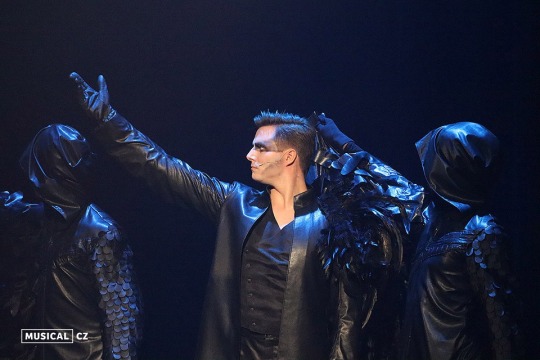
(More under the cut)
Smrt and his angels are designed to look very birdlike, specifically like carrion crows/ravens, who are frequently associated as symbols/bringers of death. The choice to really lean into the bird-inspired costumes was especially smart when combined with the Czech translated lyrics, which really leaned into the bird-associated symbolism in the text.
I must confess that when I first saw the production photos, I didn't like the costumes. I think it might have been because I already had the association formed that Tod in a pleather costume is not a good choice. However, what really made me love the costumes is when I saw them onstage and saw them in movement. I don't know what kind of weird pleather the costume workshop used, but despite obviously being pleather, it had such beautiful light movement on both Smrt and the angels and flowed so beautifully every time they moved.
The angels all wear long coats with hoods, one of their sleeves is close fitting and covered in little "feathers" and the other is made to look like a wing. The wings, aside from creating gorgeous movement, were also used to create Rudolf's grave during Totenklage, which was an absolutely genius move.
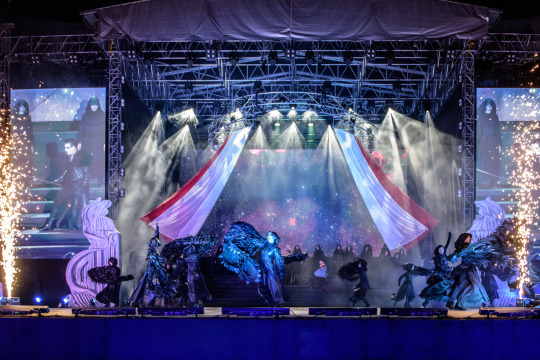
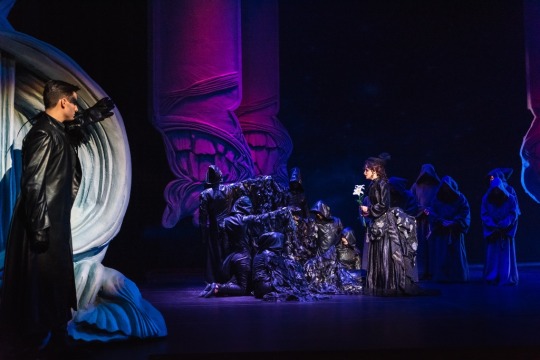
(Two of the angel dancers with Jan Kříž as Smrt)
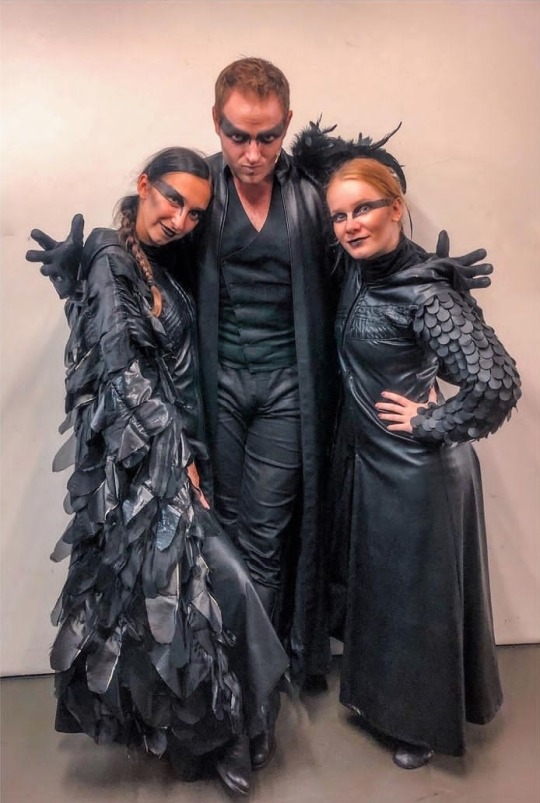
Smrt is given a different costume to clearly differentiate him as the leader of the flock/not an angel himself. And I honestly think his costume is ICONIC. He wears a pretty standard undercostume of pants with knee high boots and a vest, but I like that instead of buttoning straight down the front, Smrt's vest buttons diagonally. Which is a tiny detail, but it shows that Smrt is not a human.
And then, there is that absolutely EPIC coat. The coat is pretty simple at first glance, but just the way it's patterned and cut is very interesting, since the front is cut a bit shorter so the Smrt actors don't step on it, but the back pieces are kept longer to have more movement in the garment. And the back was given triangular gores in the "skirt" of the coat for even more movement.
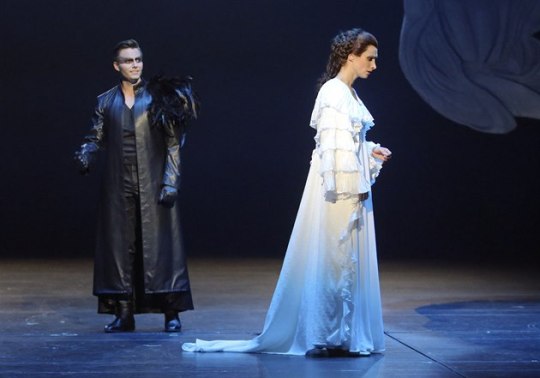

And of course, instead of the wing sleeves, Smrt has a feathered shoulderpiece made out of various types of feathers, most prominently rooster feathers, which throw subtle green and blue reflections under the stage lights. Once again, I have to mention the movement, because those feathers at moments seemed to live a life of their own, almost ruffling themselves up with the movement.

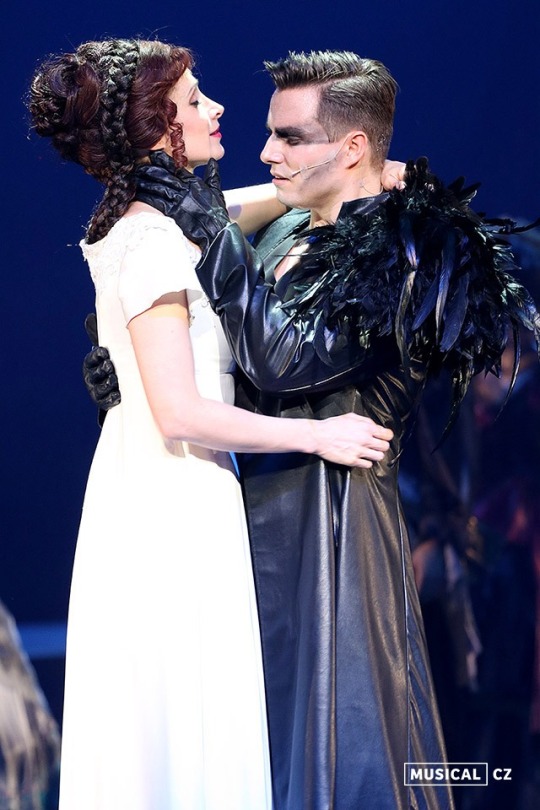
Also, you might have noticed I talked about the coat and vest, but not a shirt and that is because Smrt just doesn't wear one. Which is just a detail that is so subtle, but when you know about it, it is just one more of those details that just show that Smrt is not a human. And if you need proof that there indeed isn't a shirt (and this is an excuse for me to include one of my favorite silly pictures of Pavel Režný as Smrt):

And of course, the makeup deserves a mention, because once again, it's ICONIC. Both Smrt and the angels wear a bold black eyepaint, with the angels sporting a more graphic liner look alongside black lipstick and Smrt having a more simple, but varied look through the production's 4 year run.
And what I think speaks to the greatness of the costumes is that the actors themselves were fond of wearing them. Pavel Režný in particular seemed very fond of his Smrt costume and makeup, doing the pre-show soundchecks in almost full costume and with the eyepaint, donning the full Smrt costume and makeup for concerts only to have to immediately take the full thing off and after the production derniere in Brno evidently not taking the Smrt makeup off until he returned home in the middle of the night.
Pavel Režný also went through multiple hairstyle changes through his run as Smrt, since he had to grow his hair out for Jesus Christ Superstar. So, after the derniere, we got a full on Jesus!Smrt moment for an offstage event. Tbh, I wish we had gotten this more flowy hairstyle on Smrt onstage while the show ran, because it is a look tbh:
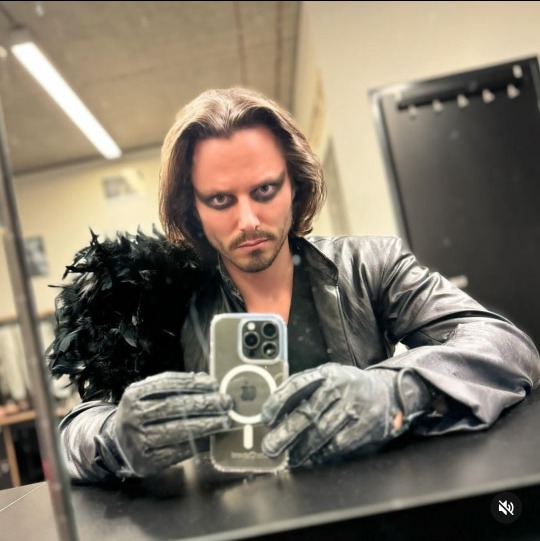
Hope I didn't make this one too long and overwhelming, but I just love this production so damn much and feel free to ask more about it!
#elisabeth das musical#djkt elisabeth#costume nerding#costume analysis#der tod#always here to talk about these costumes#genuinely one of my favorite Tod costumes of all time
12 notes
·
View notes
Text
One undertheorised aspect of Elisabeth [yes I'm approaching the show like a research field] is that of the POV in Mayerling. Setting aside/ignoring my favourite interpretation (ie. Lucheni's POV colours every scene from beginning to end), I started thinking: could it be we're seeing it through Elisabeth's eyes?
The first time Elisabeth acknowledges the mirror imagery (which is built between her and Rudolf in the Vienna-based productions) is literally right after his death - "you were like me, you needed me / I left you on your own to free myself -- / The fault is mine". She seems to see "the truth" (what the show has constructed for us to see from the start - Elisabeth's emancipation and Rudolf's isolation) and blames herself for it. And that "truth", as it is represented in the show, includes (personified) Death.
But is it really "the truth", or is it what Elisabeth has come up with in her long solitary hours despairing in the crypt? Has she, while mourning him, just begun to think back on everything she knows about Rudolf and reinterpreted his life as a nightmare similar to her own - looking to Death for guidance and comfort and yet suffering as a result? Maybe Elisabeth isn't just observing; she's interpreting and creating (the narrative) before our eyes. What we see happen to Rudolf before that point is her hindsight. And ok the implications are kind of horrifying especially for Schatten reprises where Tod really goes at it physically, like, her imagining Rudolf suffering like that - like she has with depression as well, in DLT and WITW - over and over (in Mayerling too) and not being able to stop it because he's already dead.
Granted, there are some things that make this less likely: ie. the overall strength of the Lucheni interpretation (I think it's the canon one honestly, there's too much evidence to ignore) as well as the historical fact that Elisabeth remained mostly ignorant of Rudolf's political writings and aspirations even after his death, but it's still interesting to think about.
In any case I don't think Rudolf is in control of his own narrative like traditional fictional characters are - and why should he be, he's a minor character in a show using storybook/circus/etc aesthetics as an artistic device. He's in control of his actions within that narrative (ie. Elisabeth saying his death is her fault is not really true), but he's really a plot device. And therefore:
1)conspiracy bad XDD
2) Mirror imagery good, hence removing the mayerling kiss horribly bad
3) what if Elisabeth made up Mama, schatten reprise and Mayerling after the fact, while despairing and overthinking what she could've done differently during Totenklage (out of all the candidates for "narrator"/POV character, Rudolf is just about the unlikeliest person in the show - he's only born halfway in and dies before it ends)
Fourth point under the cut for whining XD Might delete that part later
4) i keep saying this ad nauseam but we do not really need more/expanded mayerling (or rudolf immorality) stuff in the show ahsjfkggkkf. I get that in terms of history and the public sphere, we need justice and spotlight for Mary, but the show is about the death of liberal politics through Rudolf and it's already unclear to some people so we don't need to make it more confusing for them. Based on the level of reading comprehension online re my favourite shows I don't trust people to understand the symbolic death of liberal Europe in the face of Hass AND the rudolf-elisabeth mirror imagery AND Rudolf as a historical person being complicated and shitty. The last one can be brought into it through acting I think, but we don't need to change the staging to be heavier on the historical Mayerling stuff. You can criticise the portrayal, you can think Elisabeth does a bad job of portraying Rudolf and normalizes abuse or murder or something, but you can't really change how it's depicted without wrecking the architecture of the show. Rudolf literally has no canon personality beyond "sad" [being gay for death is part of this] and "struggling politically"
I promise i'm not sexist and horrible btw akjsjdjdfkgkg. But like legit. Rudolf already comes as a matching set with the mayerling affair in the public sphere. Elisabeth is like the only thing where his political legacy (or lack thereof) is of equal importance, and the portrayal is generally sympathetic. I'm not saying we can't do more rudolf media that addresses it with more complexity, but Elisabeth is not the time or place - especially since if we did include more of the Mary stuff (as a staging choice, since the script is set), it would almost certainly fail to do anything meaningful in terms of her historical legacy, given that she wouldn't be named (can't stop the mayerling sequence to give a spoken rundown of events...), and her life and personality beyond the circumstances of her death would once again be overshadowed by her ending up in Mayerling
22 notes
·
View notes
Photo
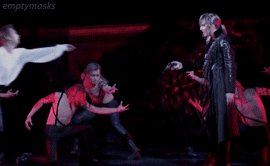
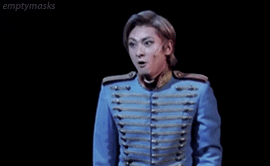

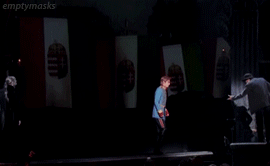




Elisabeth Das Musical Meme: [1/4] Rudolfs - Furukawa Yūta
Japan, Toho Production, White Version, 2016
#Furukawa Yuta#elisabeth das musical#elisabeth the musical#musicaledit#musicaltheatreedit#ey i'm staring a new gif series#lets see if i finish this one#elisabethdasmusicalmeme#myedits#crown prince rudolf#this is the gayest der tod by the way#like from how he is with rudolf in die schatten and mayerling#and how he rejects elisabeth in totenklage#yeah sorry sissi#Shirota Yu
100 notes
·
View notes
Text
It's actually even more prevalent than that, being used by Franz Joseph at multiple points! It first appears in Jedem gibt er das Seine ("if I could, I would be gentle"; also appears when Grünne describes their non-intervening foreign policy), then in Eine Kaiserin muss Glänzen ("I'd love to stand by your side, but it would be better for us both if you followed my mother's advice"). He also uses it with Sophie later, but there it doesn't fit these themes (the song it appears in was only introduced later as an intro to Bellaria, it's not part of the original staging), so I'll ignore that.
FJ's tone is always gentler than Sophie's, but he leans on what he learned from her all the same. She raised him to act according to her philosophy, and even when he struggles against it like in Jedem, he ultimately accepts what she teaches him. It's a melody that represents failing to act when you should, when taking action would bring about positive change. It's so interesting to think about it in the wider thematic context of the show - especially when Rudolf's central anxieties are about everything going wrong with nobody intervening (and him being rendered unable to act by the court system and his father especially). And then ending up at Mayerling because of lack of support.
Like you said, Elisabeth starts out being hurt by this melody, to the point that it's what provokes IGNM - but by late on the second act, she's the one using it against Rudolf. In my opinion, it really highlights the central argument of the show: Elisabeth achieved the freedom she wanted, but in the context of the oppressive world she lived in, it could only happen if she hardened herself to the point of being unrecognisable as the sweet, idealistic girl that she was at the beginning. She ends up at a point where she can be cruel to others to further her own goals, because she sees it as a necessary, unavoidable evil. Like Franz, she's ultimately accepted Sophie's pragmatic approach.
What happens after Spiegel could be understood as a final result of Elisabeth's tragic character arc - becoming hard and cold like those around her, because it's the only way to preserve her freedom.
Just realized that in ‘If I Were Your Mirror’ when Elisabeth rejects Rudolf she uses the same melody associated with Sophie. The same melody used to tread her into submission and abuse her and make her life hell is the one she’s using to push her son away for the last time. And of course the Mayerling Waltz comes directly after…
#if i ever wrote elisabeth/tod fanfic it would be something highly messed up with him being like. glad that she's become so sad and bitter#osbflsk i'm awful#but uh yeah elisabeth's character arc kinda culminates in spiegel/totenklage - after that she's just broken and seeking death#the central action of the story from then on is not driven by elisabeth herself but tod and lucheni#'wrapping up loose ends'#also re: sophie's pragmatism - i can't help but see parallels to political realism (a viewpoint according to which humans are inherently#selfish and looking out for your own benefit is only rational) which is a position often advocated by far-right political figures#it's fundamentally opposed to rudolf's and elisabeth's idealism#so it's really interesting that elisabeth kinda resorts to that in the end#tbh the political meaning doesn't really apply to elisabeth - irl she just didn't intervene in her later years but kept her idealist views#so it was less malice/her politics shifting than it was just plain inaction#osbdlsk maybe that is a tangent sorry#elisabeth das musical#musicals#theatre#analysis#elisabeth#history
91 notes
·
View notes
Text
Incoherent scrap of Elisabeth thought for the evening: I've seen a decent amount of discussion about who/what der Tod is - is he an actual entity who happens to fixate on Elisabeth and spends the rest of her life following her around? Is he a manifestation of Elisabeth's - and later Rudolf's - depression, the voice of their self-loathing and suicidal thoughts which has been given a physical form for the play? Is he Lucheni's creation, born of his need to shift the guilt from his own soul - after all, if der Tod was the one pulling all the strings, then Lucheni was just another puppet, just following orders?
I think it depends on the production/actor, and in my favourite German-language Tods, I think at least two - possibly three - of the interpretations are covered.
Uwe Kröger is the first one. His Tod is a real being. He's otherworldly and mystical. He's able to interact with the human world (obviously) but rarely does unless it's time for someone to die. He's not a nice guy, but he's not actively malevolent; kissing people to death just happens to be the reason he exists, so that's what he does. Something about Elisabeth catches his attention and he becomes obsessed. His methods of pursuit are the only ones he knows, and he's not even necessarily aware of the damage done. I absolutely love how Uwe does the act one Schatten; it's this eerie sense of "hmm, it turns out that killing her daughter doesn't make her fall for me. Fascinating creatures, humans." The way he walks and moves onstage, and his appearance in general (particularly the pallor and white-blond hair of the original Vienna version) give an impression of something inhuman and apart.
Máté Kamarás might be another take on option 1. This excellent post sums up the argument for this better than I could do. Like Uwe's, his Tod is real; he just happens to be less ethereal and more emotionally volatile. He's not used to feeling like this about anyone, and when his attempts to woo Elisabeth fail, he lashes out. A lot. His face during der Schleier fällt has this mix of joy and amazement, like he can't quite believe it's finally happening. At first, anyway. Then after the kiss, he suddenly realizes - for the first time - that because he's death, having Elisabeth means losing Elisabeth.
There might be a case for Máté's Tod being Lucheni's invention, but it's a bit weaker. I'm basing this more on a sort of matching chaotic, frantic energy between his Tod and Serkan Kaya's Lucheni in the 2005 proshot that might speak to der Tod being a product of Lucheni's psyche. There's also that one moment during Prolog when Lucheni says that Elisabeth loved Heinrich Heine, and der Tod gives him this (honestly slightly comical) death glare (pun intended). It's a sort of warning, "look, buddy, you may have conjured me as a focus for your guilt, but by doing that you give me power in the story as the master puppeteer. Knock it off with the Heine."
Finally, Mark Seibert's Tod is depression and suicidal ideation made flesh. His Tod is, quite frankly, an absolute bastard. He can be seductive, but it's always with an ulterior motive, and the motive is always cruel. With both Elisabeth and Rudolf, he goes from sweet-talking to physically rough, even violent. He coaxes them to self-destructive behaviours, then scorns them when they self-destruct. He toys with them by letting them think life might be getting better, then moves in to strike. He's around to put a damper on things when Elisabeth thinks she's at her highest (wenn ich tanzen will), and to push her past rock-bottom when she's at her lowest (Totenklage). He can drop Rudolf like a rag doll once he's dead because he never cared for him; he was manipulating him in order to destroy him. Depending on the production, he can leave Elisabeth onstage once she's dead for the same reason. To both Elisabeth and Rudolf, he comes across almost like an abusive, stalking-prone partner. From my own experience, that's a pretty fair description of depression, except that the abusive bastard is your own brain. For what it's worth, it's also a pretty fair description of an eating disorder, which the real Elisabeth definitely had, although it doesn't get more than a passing mention in the show. This might actually be part of the reason I like Mark's Tod so much - the idea that my own depression can be separated from myself.
In the musical overall, there are moments and lyrics that could be evidence for each of the interpretations of der Tod (along with others). Personally, I go back and forth on which I feel is most strongly supported, and I think part of the reason is that different productions and different Tods lean more strongly towards one or another.
#i have no idea how much sense this makes#lit crit was never my strong suit#as you can probably tell#elisabeth das musical#german musicals#musical theatre#my ramblings#discussion: elisabeth
52 notes
·
View notes